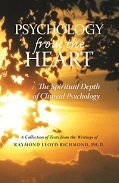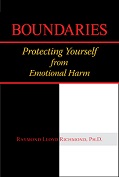|
|
|

I
appreciate your writings on Borderline Personality
Disorder. But I have not seen anything on your website specific to
spouses of BPD individuals. Would the advice you gave to the young lady
whose mother had BPD also be appropriate for
a spouse?
I have long suspected my husband suffers from BPD. He
can be sweet and loving at times, but all I have to do is disagree with him
about something and a mask of rage and hatred comes over him. He then viciously
attacks and devalues me, and afterward never shows any remorse for the wounding
he caused me. Like the young lady’s mother mentioned above, my husband is
unable to care about my feelings. If I try to tell him, “You really hurt
my feelings,” all I do is open myself to another attack, which may come in
the form of verbal insults, hateful glares, or as passive-aggressiveness.
Sometimes when I have greatly offended my husband—especially
if I try to set a boundary with him—he will openly burn with anger and hatred
against me for weeks or even months at a time. After many years of marriage I am
feeling very worn down and exhausted with the constant put downs and hostility I
endure. No matter how hard I try to be the perfect wife, raise the perfect family,
cook the perfect meals, he treats me with scorn and contempt. Although there are
rare times he is affectionate and kind, it is more common for him to tell me that
I am useless to him, a burden, that we are in no way equals, and that I should
grovel at his feet for everything he gives me. Recently I tried to tell him that
due to his scornful treatment of me I no longer felt comfortable with marital
relations, and he became so enraged that he tried to kick me out of the house,
telling me that he would not pay for me to live here if he got nothing in return.
I believe I should also mention that my husband has many
addictions, including cigarettes, marijuana, alcohol, television, and pornography.
He takes very little interest in our children but spends the majority of his time
watching TV and becoming intoxicated.
I cannot endure any more of the rage and abuse, and
I do not want the children to be raised in a home with these ugly addictions and
behavior present. Yet I do not believe in divorce. Also, I feel certain in my heart
that my husband is a good man deep down, under all the layers of ugly rage and
hatred. Is there anything I can do to help this situation? I am seeking God with
all my heart, trying to live a holy life, and praying constantly. I also try my
best not to be afraid of my husband and to speak the truth in love. But I don’t
know what else I should do. I just can’t take the rage anymore.
Thank you on behalf of all the spouses of BPD individuals out
there. I know there are many of us suffering and confused.
 |
 efore addressing any of the issues
about your husband, it’s important to understand the core dynamic of Borderline
Personality Disorder (BPD). BPD is based in the rage of being—or feeling—unnoticed
and emotionally abandoned in infancy. That rage then takes over a person’s whole
being, and all of his or her actions—consciously or unconsciously—become directed
throughout life to inflicting hurtful revenge on others for any perceived neglect of
his or her emotional and physical needs. efore addressing any of the issues
about your husband, it’s important to understand the core dynamic of Borderline
Personality Disorder (BPD). BPD is based in the rage of being—or feeling—unnoticed
and emotionally abandoned in infancy. That rage then takes over a person’s whole
being, and all of his or her actions—consciously or unconsciously—become directed
throughout life to inflicting hurtful revenge on others for any perceived neglect of
his or her emotional and physical needs.
Consequently, notice carefully that even
though BPD rage may be inflicted on others, it is really “aimed” psychologically at
the source of the original wounds: the BPD individual’s parents. This, then, points
to the most important concept of coping with a BPD spouse: the drama and the rage is
not about you.
It’s Not About
You
Although many persons can be legitimately
diagnosed with BPD, many persons have BPD characteristics without meeting all the
psychological criteria for a diagnosis of BPD. Nevertheless, all of these persons,
diagnosed or not, have the same tendency to react to emotional hurt with a
melodramatic
rage and abuse that the hurt does not justify. In fact, no hurt
justifies anger, but the BPD individual stirs up the anger so as to stew in a
resentment that punishes others and at the same time demonstrates
unconsciously that
he or she is a despicable person who really deserves the cruelty and neglect
experienced in childhood. (That internal self-loathing is the psychological reason for
the alcoholic behavior, drug use, cigarettes, and pornography that
possess your husband.) It’s truly a pathetic state of mind, and
so, when you are on the receiving end of the rage, the only way to preserve your
psychological and spiritual sanity is to remember that the drama and the rage is
not about you.
Keep in mind here that even if you ever
do something that hurts a BPD individual, you can repent your mistake, tell that person
that you’re sorry, and ask God in His mercy to teach you to
not make the same mistake again. But that won’t be enough for a BPD individual.
Forgiveness will be
thrown to the wind, and old resentments will blow up into
melodrama.
So, when this happens, to protect yourself
from getting worn down and exhausted, you don’t have to try to be perfect, and you
don’t need to blame yourself and feel like a failure; instead, tell yourself, that
yes, the abuse hurts, but “It’s not about me.”
Then you can work on setting healthy
boundaries.
Boundaries
You say that your husband is a good man
deep down, and that’s in accord with Catholic theology. The Church has always taught
that God creates all of us good, and that through our
free will we can choose to accept the
redemption given to us in Christ if only we
repent our offenses against love and
return to God in chaste purity.
Therefore all BPD individuals are good,
deep down, and so it’s important to understand that BPD individuals want someone to
stand up to them rather than run from their rage; they want someone to refuse to be
pushed away by the hostility and to have the courage to face the BPD rage with
compassion and love.
Nevertheless, it’s also important to keep
in mind that BPD individuals are very sensitive to rejection, so anything you say to
them that has an accusatory tone will provoke intense
shame, such that they will stew in
resentment and, sooner or later, explode in rage.
Consequently, in dealing
with someone who has BPD symptoms, it will be essential that you use strong but
sensitive boundaries. Consider the following points when you set boundaries to
protect yourself.
If the person is in a BPD rage, or is just
blatently rude, then use forceful and succinct containment of the unwanted
behavior.
• |
Contain the
insanity. When someone rants in BPD rage, more
often than not facts can be distorted, and trying to defend yourself against unjust or
unfair accusations will be futile. So calmly but firmly say, “That was inappropriate
and unnecessary. Knock it off!” or “Cut out the hostility! That’s a sad lack of
charity!” or “Shut up!” or “Turn down the music!” |
If the person is in a relatively calm state
of mind, then speak confidently yet politely to address the unwanted behavior.
• |
Be careful not to tell
anyone what to do. Set boundaries by stating what
you will do under specific circumstances. For example, say, “If I hear cussing then I’m
going to [leave the room, or hang up the phone, etc.].” |
• |
Be willing to
teach. As an extension or the above point,
when someone speaks to you with hostility, smile and say calmly, “I’m not going to
listen to anything said with rudeness, but if you speak to me kindly then I will be glad
to listen to you. So go ahead, try saying it again, but with gentleness.” |
• |
Resist the temptation
to respond to accusatory e-mail, text, or telephone
messages. Responding to such messages puts you
in the impossible place of trying to reason with insanity. The only sane recourse is to
ignore all such messages. |
Sexuality in Marriage
The matter of sexuality in a marriage
applies to any marriage, not just to a marriage in which one spouse is a BPD
individual.
So, regardless of what any man might
try to claim, a husband has no right to treat his wife like a prostitute. Saint
Paul tells us that a husband’s obligation is to sanctify his wife so that she might
be “holy and without blemish” (see Ephesians 5: 26–27). Once
lust enters a marriage the husband and wife
are both on a path to doom.
In such a case, the wife has a difficult
choice to make. Should she take a stand for holiness, or should she capitulate to
her husband’s demands, thereby condoning sin, so
as to make things easier for herself, even though it may lead to the doom of both her
and her husband? Although many women through the ages, such as
Saint Maria Goretti, have gone so far as to choose the
path of martyrdom, it’s a choice a woman must make according to the depth of her
love for God.


Healing
|
Though
Demons
Gloat
|
Anger
&
Forgiveness
|
Falling
Families,
Fallen Children
|
Disasters
and
trauma
|
Psychology
from the
Heart
|
 |
 |
 |
 |
 |
 |
Psychological Healing
in the Catholic Mystic tradition |
True Christian
Identity
In Confronting
Evil |
How to Turn the
Emotional Wounds
of Daily Life Into
Psychological Growth. |
The Psychological
and
Spiritual Remedy
For Our Cultural
Disintegration |
The Struggle For
Psychological
and Spiritual
Growth |
Collected Texts
About the Spiritual Depth of
Clinical Psychology |
More information |
More information |
More information |
More information |
More information |
More information |
Desire
and
Distraction
|
Fear
|
Stopping
Smoking
|
Borderline
Personality
Disorder
|
Catholic
Compassion
|
 |
 |
 |
 |
 |
A Catholic Perspective
On Behavioral Change
and Its Subversion |
A Catholic Explanation
Of a Universal
Problem |
Through
Faith
and
Prayer |
Healing
the
Rage |
When They Tell You
That the Moral Teachings
of the Catholic Church
Are Wrong |
More information |
More information |
More information |
More information |
More information |
|




















